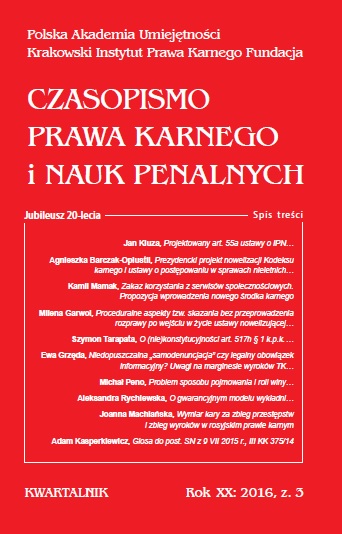O gwarancyjnym modelu wykładni prokonstytucyjnej przepisów typizujących czyny zabronione pod groźbą kary
On a guarantee model of the interpretation of pro-constitutional provisions that specify acts prohibited under penalty
Author(s): Aleksandra RychlewskaSubject(s): Criminal Law
Published by: Polska Akademia Umiejętności / Krakowski Instytut Prawa Karnego Fundacja
Keywords: pro-constitutional interpretation of criminal law; legal good; nullum crimen sine lege; the principle of legal security of an individual
Summary/Abstract: Przepisy typizujące czyny zabronione pod groźbą kary stanowią ograniczenie konstytucyjnych praw i wolności jednostki, i jako takie winny być opisane w akcie prawnym rangi ustawy (nullum crimen sine lege) i uzasadnione koniecznością ochrony pewnych dóbr przedstawiających wartość społeczną (nullum crimen sine periculo sociali). Mówiąc o wykładni prokonstytucyjnej prawa karnego mieć można na myśli takie zrekonstruowanie normy prawnej, która z jednej strony najlepiej zabezpiecza dobra prawne, z drugiej zaś mieści się w granicach językowego znaczenia przepisu ustawy. Przyjmując bowiem, że art. 42 ust. 1 Konstytucji RP wysławia regułę prawną, która nie podlega stopniowaniu tak na etapie stanowienia, jak i stosowania prawa, przepis – aby spełniać konstytucyjny standard – musi precyzyjnie wyznaczać zakres kryminalizacji. Mając na uwadze akceptowaną przez Trybunał Konstytucyjny praktykę prawodawczą posługiwania się znamionami odsyłającymi (blankietowymi), czy klauzulami generalnymi, w artykule stwierdza się, że granice czynów karalnych częstokroć dookreślane są przez władze wykonawczą i sądowniczą. Zasada nullum crimen sine lege funkcjonuje tu zatem jako zasada optymalizacyjna, która może być spełniona tylko w jakimś stopniu. Autorka twierdzi, że model wykładni prokonstytucyjnej winien uwzględniać wartość bezpieczeństwa prawnego jednostki, która nie została należycie zabezpieczona przez prawodawcę. Provisions specifying acts prohibited under penalty constitute a constraint on the constitutional rights and freedoms of the individual, and as such they should be described in the legal act of the act (nullum crimen sine lege) and justified by the need to protect certain goods representing social value (nullum crimen sine periculo sociali). Speaking of the interpretation of criminal procedural law, one can mean such a reconstruction of a legal norm that, on the one hand, best protects legal goods, and on the other hand falls within the limits of the linguistic meaning of a provision of the Act. Assuming that art. 42 par. 1 of the Constitution of the Republic of Poland praises the legal rule, which is not subject to gradation both at the stage of making and applying the law, the provision - to meet the constitutional standard - must precisely define the scope of criminalization. Bearing in mind the legislative practice accepted by the Constitutional Tribunal for the use of reference tokens (blanks) or general clauses, the article states that the limits of punishable acts are often specified by the executive and judiciary. The principle of nullum crimen sine lege functions here as an optimization principle, which can only be fulfilled to some degree. The author claims that the model of pro-constitutional interpretation should take into account the value of the legal security of the individual, which was not duly secured by the legislator.
Journal: Czasopismo Prawa Karnego i Nauk Penalnych
- Issue Year: 20/2016
- Issue No: 3
- Page Range: 131-149
- Page Count: 19
- Language: Polish

